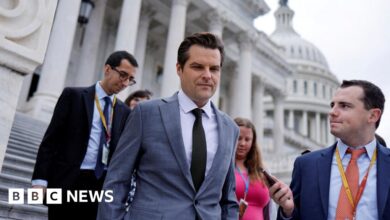Why is Honduras threatening to expel US troops? | Military News

Honduras threatened to expel US forces, in response to plans by incoming President Donald Trump to carry out military operations. Mass deportations Of refugees and asylum seekers entering the United States from Central America.
Trump’s plan could affect hundreds of thousands of people from Honduras, a country that hosts a large US military base.
Here’s the gist of the dispute between the world’s largest superpower and its smaller neighbour, why it matters and what it means for relations between the two countries.
What did Honduras say about American forces?
In her New Year’s message, Honduran President Xiomara Castro threatened to reconsider the country’s military cooperation with the United States if President-elect Donald Trump continues mass deportations of illegal immigrants.
Castro stated that US military installations in Honduras, especially Soto Cano Air Base, would “lose every reason for their existence” if such deportations occurred. But she also used the opportunity to criticize the long-term US military presence on Honduran soil more broadly.
“In the face of the hostile situation of mass expulsion of our brothers, we must consider changing our cooperation policies with the United States, especially in the military field, where for decades, without paying a cent, they have maintained military bases.” “On our territory, which in this case will lose every reason to be in Honduras,” she said in a Spanish statement broadcast on national television.
How important are US military bases in Honduras?
The US military presence in Honduras, although focused on Soto Cano Air Base, is part of broader operations in Central America that include smaller bases in El Salvador.
Soto Cano, who began working in the 1980s to combat perceived communist threats in the region, hosts more than 1,000 American military and civilian personnel. It is also one of the few locations capable of landing large aircraft between the United States and Colombia, with the exception of Guantanamo.
The base serves as a major staging point for the rapid deployment of US forces to the region, including providing disaster relief, aid administration, and counter-narcotics operations.
Its location provides proximity to drug trafficking corridors in Central and South America, which also makes it an essential starting point for surveillance and interdiction.
However, some experts criticized the US justification for its military presence in Soto Cano after Washington backed the government of Juan Orlando Hernandez, who was eventually extradited to the US in 2022 on charges of drug crimes and money laundering.
Hernandez was president of Honduras twice, and has been serving a 45-year prison sentence in New York since June 2024.
“It’s hypocritical to say they use it [Soto Cano] “The fight against drug trafficking when the United States was supporting, legitimizing and pouring millions of dollars into the president of Honduras and his corrupt police and army,” Dana Frank, professor emeritus of history at the University of California, Santa Cruz, told Al Jazeera.
Meanwhile, while the United States is not paying Honduras for the base, Soto Cano serves the Central American country as well.
“The US military presence in Honduras is generally popular, makes an economic contribution, and provides specific benefits to Honduras in terms of infrastructure development, intelligence, and emergency assistance in times of extreme weather that often affects Honduras,” said Global Fellow Eric Olson. At the Wilson Center.
How significant is the threat – and why is Honduras doing it?
Experts say the threat from Honduras represents an important moment in the geopolitics of Central America.
“I think this is a really wonderful and powerful turning point in the role of the United States, which took for granted that it would dominate the Western Hemisphere, and that it would particularly dominate Central America,” Frank said.
Frank said the U.S. military may be particularly inclined to keep Soto Cano amid competition with China, which has no military presence in Central America.
Analysts say Honduras also does not want to sever ties with the United States. The country relies on remittances from its citizens abroad: 27% of its GDP came from remittances in 2022. Its largest community is in the United States, where about 5% of Honduras’ population — more than 500,000 people — lives, according to Pew. . Research Center Estimates.
Hondurans play a major role in the US economy, especially in labor-intensive sectors. In the Francis Scott Key Bridge collapse in Baltimore in March 2024, one of the six construction workers killed was a Honduran national, while the others were immigrants from Mexico, Guatemala and El Salvador.
However, this same dynamic makes it difficult for Honduras to remain silent in the face of threats of mass deportation. Deputy Secretary of State Tony Garcia said about 250,000 Hondurans could be expelled from the United States in 2025, a number the Central American country is suddenly ill-equipped to host.
Without remittances from its citizens in the United States, Honduras’ economy could also take a major hit.
How likely is Honduras to follow?
Some analysts view the threat as a negotiating tactic rather than an immediate policy shift, and say Honduras lacks the leverage necessary to meaningfully influence U.S. policies.
“Ultimately, I feel that Honduras is making threats with a very weak hand,” Olson told Al Jazeera.
Frank described the move as a “pre-emptive strike” against Trump and a major assertion of the sovereignty of Honduras and Central America.
Trump has pledged to quickly deport illegal immigrants, but his team has offered no concrete plans, leaving Latin American governments in a state of uncertainty as they try to prepare.
He has also vowed to slap A 25 percent tariff On Mexico and Canada if they do not stop the flow of migrants and fentanyl into the United States.
How might the United States respond – and what does this mean for bilateral relations?
Olson told Al Jazeera that the threat could have broader implications for relations between the United States and Honduras, especially under a Republican-led administration. He said the Honduran government was “playing with fire.”
“I cannot imagine that President Trump will take kindly to threats to the US military from a government that Republicans already seem keen to classify with Nicaragua and Venezuela,” he said, predicting that bilateral relations may be “about to take a turn for the worse.” “Regardless of the outcome surrounding Soto Cano.
For the United States, a potential rupture in military ties with Honduras will likely be viewed as disappointing but not critical to its military operations, Olson said.
To be sure, Soto Cano played a major role in the 1980s in the US-backed Contra war against Nicaragua and supporting operations in El Salvador.
“It has a long, bad history,” Frank noted, including its use during the 2009 military coup in Honduras, when President Manuel Zelaya’s plane refueled there.
But Olson pointed out that Soto Kano Air Base no longer has the strategic importance it had during the 1980s and 1990s.
“The U.S. military has been considering its withdrawal from Soto Cano for some time,” Olson said, adding that missions such as counter-narcotics and emergency response could be carried out from other locations.
Frank also warned that Republicans, including Marco Rubio, would likely portray President Castro’s government as allied with anti-American governments such as those of Venezuela and Nicaragua.
“This is likely to be integrated into a broader anti-communist Cold War framework,” she said.
https://www.aljazeera.com/wp-content/uploads/2025/01/AP8803240194-1735995891.jpg?resize=1920%2C1440
2025-01-05 06:50:00





